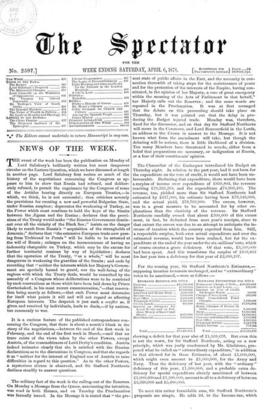The Chancellor of the Exchequer introduced his Budget on Thursday
night. In relation to the past year, had it not been for the expenditure on the vote of credit, it would not have been un- favourable. Deducting that expenditure, there would have been a surplus of income over expenditure of £859,803, the revenue reaching £79,763,298, and the expenditure £78,903,495. The revenue, too, yielded more than Sir Stafford Northcote had estimated by £617,000, his estimate having been £79,146,000, and the actual yield, £79,763,000. The excess, however, was in a great measure to be accounted for by other ex- planations than the elasticity of the revenue. Sir Stafford Northcote candidly owned that about £300,000 of this excess must, in fact, be deducted from next year's receipts, since to that extent the excess was due to an attempt to anticipate the in- crease of taxation which the country expected from him. Still, a respectable surplus, both over actual expenditure and over the estimated revenue, would have been realised, but for the ex- penditure at the end of the year under the six-millions' vote, which of course creates a grave deficiency. Of that vote, £3,500,000 had been spent. And this transforms the surplus of £859,803 for last year into a deficiency for that year of £2,640,197.


































